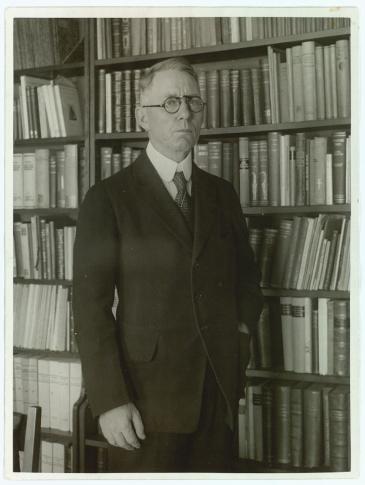Johannes V. Jensen (1873-1950)

Danish novelist, poet, and essayist, who won the Nobel Prize for literature in 1944.
Jensen attempted to depict how human development was guided by an idealized Darwinian theory of man as part of an evolutionary trend. His major works include Kongen's fald (1900-01), the most significant historical novel in Danish literature, and Den lange rejse (1908-22), an evolutionary interpretation of the biblical legends.
The elder spreading
her dew-cold hands
toward the summer moon
A year later:
The self-same beeches
and twilight nights,
the same elation!
(from 'Envoi')
Johannes Vilhelm Jensen was born in the small village of Farsø, Himmerland, in North Jutland, the second son of the district veterinary surgeon, Hans Jensen, a descendant on both sides of farmers and craftsmen, and Marie (Kirstine) Jensen. Until the age of eleven, Jensen was taught by his mother. He graduated from the Cathedral School of Viborg in 1893, and subsequently studied medicine at the University of Copenhagen from 1893 to 1898. Jensen's medical studies, including preliminary examinations in botany, zoology, physics, and chemistry, deeply influenced his literary work. Between his first two novels, which appeared in 1896 and 1898, Jensen visited the United States - disrupting his studies. Jensen also wrote romantic potboilers and a series of detective novels which appeared in a weekly periodical under the pen name Ivar Lykke. He was a correspondent for the newspaper Politken and reported from Spain on the Spanish-American war. In 1904 he married Else Marie Ulrik; they had three sons.
Half awake, half dozing,
In an inward seawind of dadaid dreams
I stand and gnash my teeth
At Memphis Station, Tennessee.
It is raining.
(from 'At Memphis Station')
In Danskere (1896) and Einar Elkjær (1898) Jensen moved in the fin de siècle atmosphere of Copenhagen, but most of Jensen's early writings were set in his native province. Himmerlandshistorier (1898-1910) portrayed vividly his native region and its people. It was followed by a historical novel of the 16th century, Kongens fald, a fictional biography of King Christian II of Denmark, the last ruler of the three Scandinavian countries. It blended criticism of lyrical and realistic elements in the story of the king and Mikkel Thøgersen, a student and later mercenary. His travels in the United States in 1896 and 1903, when he saw the impact of technology on society, inspired Madame d'Ora (1904) and Hjulet (1907), and descriptions of American cities. The summer of 1898 Jensen spent in Spain. This marked also the beginning of his career as a correspondent. In 1900 he wrote articles from the World Exhibition in Paris. These writings he collected in Den gotiske renæssance (1901), which presented his enthusiasm about a modern, active way of life.
In his poems Jensen rejected "Baudelaire's poisonous hall-mark," as he wrote, and turned " to simple style and sound subject matter." As literary models he kept Goethe, Heine and Whitman's prose poems, but he also wrote in the Old Norse style. His first volume of poems, Digte (1906), contained all the youthful poems. Late in life he returned to poetry with Digte, 1901-43. Eksotiske noveller (1907-1917) was based on journeys in the Far East. Jensen travelled around the world in 1902-03, to the Far East in 1912-13, and to Egypt, Palestine, and North Africa in 1925-26. Jørgine (1926) was a story of a deceived peasant girl who saves herself from disaster by an unromantic marriage and becomes a self-sacrificing mother.
Myter (1907-1944), published in eleven volumes, was a series of essays and animal, travel, and nature sketches. Jensen's treatment is poetic; the essay form offers him a means to express his own ideas. Several of the myths found their way to Den lange rejse, a six-volume epic cycle, probably Jensen's major work, which earned him the Nobel Prize. Jensen developed in it his partly dubious theories of evolution and anthropology and described the evolution of the Northern peoples from the Ice Age to the 15th century. He started to introduce the philosophy of evolution into literature, according to the author, because of the misinterpretation and distortion of Darwinism at the end of the 19th century. "The concept of the Übermensch had disastrous consequences in that it led to two world wars, and was destroyed only with the collapse of Germany in 1945. In the course of opposing this fallacious doctrine, I have arrived at a new interpretation of the theory of evolution and its moral implications."
The first saga takes place in the most primitive times near a huge volcano and introduces a Prometheus. In the next book an outcast with his woman becomes the father of the Nordic race, rediscovers fire, and founds a new civilization. In the third saga another genius invents wagons and boats driven by oar or sail. The later sagas take the reader to historical times: Cimbrians march to Rome and the Vikings go on their raids. Finally the story ends with Christopher Columbus's voyage to America and his dream of a tropical paradise - the longing for the distant, warm places was central in this and other of Jensen's works.
In 1939 Jensen again visited the United States. After the German army invaded Denmark in 1940, he destroyed much of his personal writings. Jensen was strongly critical of Fascism and anti-Semitism. Because of the war, no presentation ceremonies were held in Stockholm in 1944, when the author was awarded the Nobel Prize. "Were one to determine the degree of maturity of each nation according to its capacity for reasoning and comprehension, England would come out on top for her sense of realism, and the man who put forward these basically English ideas in a simple, unaffected manner was Charles Darwin." (from 'Nobel Acceptance Speech', 1944) Jensen died in Copenhagen on November 25, 1950.




 del.icio.us
del.icio.us Digg
Digg

Post your comment